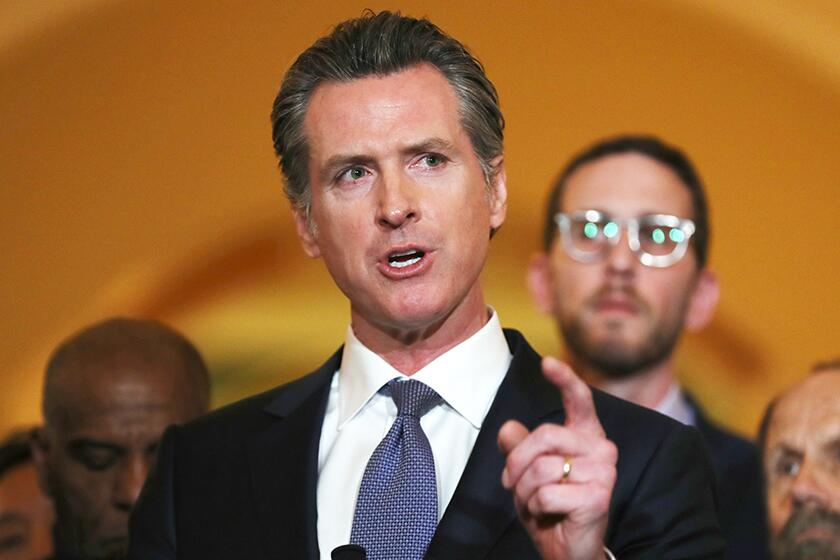US Airways could add some humanity to its ‘corporate personhood’
- Share via
Businesses enjoy the legal status of “corporate personhood.” It gives them a constitutional right to free speech, among other perks normally reserved for human beings.
So if corporations are people too, why do they sometimes have to be such schmucks?
Sheila Seberg, 72, of Newport Beach found herself asking this question after US Airways treated her with stunning heartlessness when she was forced to cancel a flight because her husband had suffered a major heart attack.
Refund the $564.30 round-trip ticket price? Forget it. The airline wouldn’t even consider it. The best it could muster was extending the ticket for a few months — as long as Seberg paid a $150 fee for a changed booking.
“I was shocked,” she told me. “It’s not like I frivolously decided not to take the trip. My husband almost died. But they showed no compassion.”
Adding insult to injury, Seberg and her husband, Richard, are steady customers of the airline. They’ve racked up scads of frequent-flier miles over the years, mostly because Richard, a dentist, flew on US Airways to his second practice in Las Vegas every week for 15 years.
“We’re very good customers,” Seberg said.
I’m always astonished when this sort of issue comes up. You’d think all businesses, and especially airlines, would have set-in-stone policies for customers facing family emergencies. Nothing cements a customer’s perception of a company like how it deals with them in a time of distress.
A few years ago I wrote about a Monrovia woman who had to cancel a $4,287 trip to Hawaii with friends after her mother died. Hawaiian Airlines said it would refund each of the three first-class tickets but deduct $225 in “processing fees.”
After my column ran and the Hawaiian media picked up the story, the airline backtracked and offered a full refund. A spokeswoman for Hawaiian Airlines acknowledged that the carrier “dropped the ball on this.”
It had. But you kind of get the feeling that such profit-minded callousness is business as usual for airlines — until the media gets involved and the matter rises to a level on the corporate food chain where company employees can actually deal with things in a humane fashion, rather than follow some policy playbook.
Seberg purchased her ticket March 14. She planned to fly June 20 from Orange County’s John Wayne Airport to Omaha to attend a family reunion.
On June 14, Seberg’s husband complained of chest pains. A visit to the doctor revealed that he’d had a heart attack and that three of his arteries were completely blocked.
Richard was rushed to the hospital and had a stent inserted into one of his arteries to improve blood flow. Two more stents would be required within the next few days.
A day after the heart attack was diagnosed, Seberg called US Airways to explain the situation and seek either a refund of her ticket or an extension on when it could be used. She said a service rep told her to mail in a letter detailing the situation and to include a doctor’s report.
Seberg did as she was instructed. The letter from Richard’s cardiologist verified that he’d had a heart attack and underwent two surgical procedures.
It took US Airways three months to process Seberg’s request. In September, the airline sent what looked like a form letter saying that “we’re sorry to learn that travel could not be completed as originally scheduled.”
It said Seberg’s ticket was non-refundable but would remain valid for a year — that is, until March 14, 2012 — after which time “it will expire and all value will be lost.”
Issuing a new ticket would require Seberg to pay “a $150 change fee and any fees that apply based on fare rules in effect at the time of travel.”
If anyone at US Airways was concerned about Richard’s condition or how Seberg was bearing up, the company was keeping it to itself.
Seberg responded with an email saying that the carrier’s letter was “a very cold response to a heart attack” and reiterating her request for the airline to at least waive the $150 change fee.
She received another form letter saying her request would be considered. And that was the last Seberg heard from the airline.
A US Airways spokeswoman, Valerie Wunder, looked into the situation at my request. She said the company couldn’t back down from its no-refund policy.
But Wunder said the $150 change fee will now be waived for Seberg, which US Airways should have done in the first place, but apparently it took them a while to realize how schmucky they were being.
She also said Seberg will have until October 2012 to use her ticket.
Richard’s ticker is doing better these days. But if his condition prevents his wife from traveling by next October, Wunder said, she can contact the airline “and we’ll see what we can do to help her.”
It’s amazing what can be accomplished when a corporate person actually shows a little humanity.
David Lazarus’ column runs Tuesdays and Fridays. He also can be seen daily on KTLA-TV Channel 5. Send your tips or feedback to david.lazarus@latimes.com.
More to Read
Sign up for Essential California
The most important California stories and recommendations in your inbox every morning.
You may occasionally receive promotional content from the Los Angeles Times.











